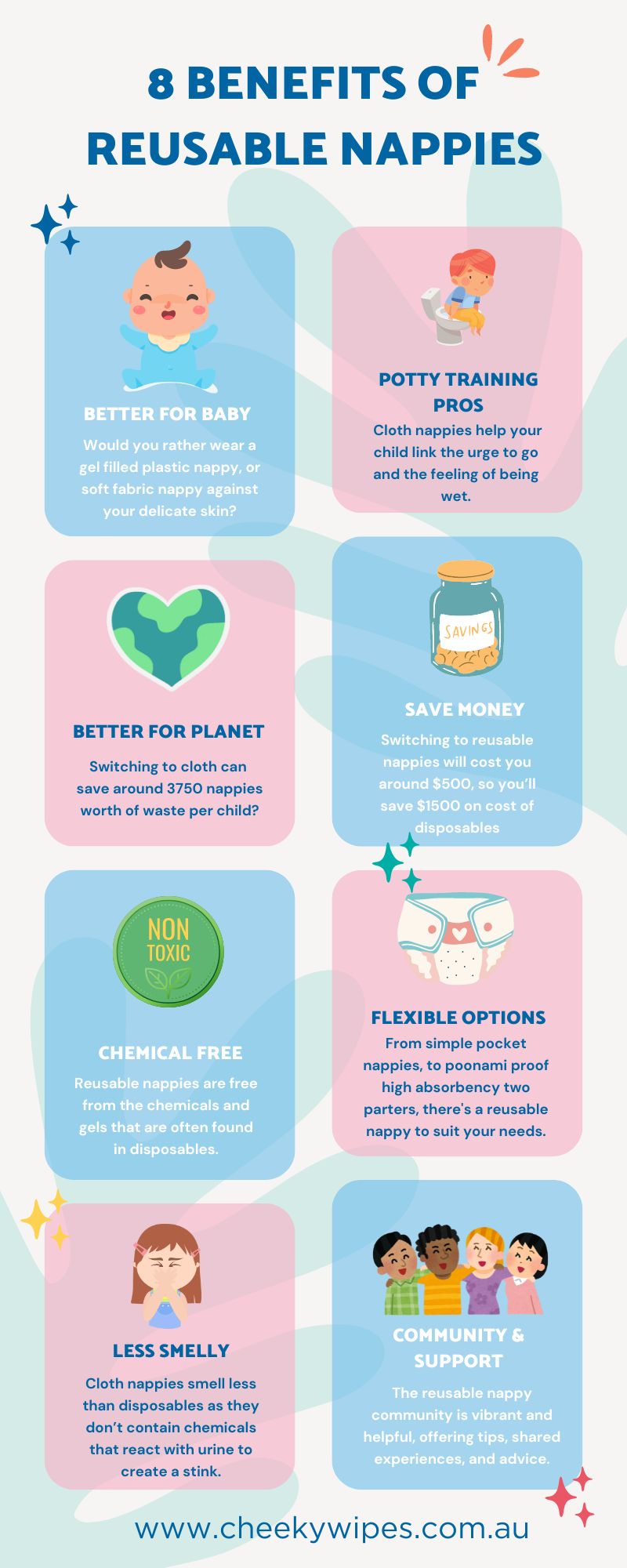Are Reusable Nappies Worth It?17 June 2024 | Admin G'day, parents and potential eco-warriors! Today, we’re diving into the world of reusable nappies to see if they’re truly the bee's knees when it comes to nappying your bub. Modern cloth nappies nappies, often made from materials like cotton, bamboo, and hemp, are not just pieces of fabric but a revolution in your parenting journey. But, the big question is: Are they worth it? Whether reusable nappies make sense for you depends on a mix of factors—cost, environmental impact, convenience, and your personal preferences. For instance, while the upfront cost of cloth nappies might make you blink twice, they’re designed to be used again and again. Just wash, dry and reuse. Over time, they can be much more wallet-friendly than disposables. Plus, if you’re planning to expand your family, those nappies can keep on saving you money across the board. However, if you’re all about convenience and aren’t too fussed about long-term savings or your environmental impact, disposables might still be your go-to. That said, for many, the switch to reusables cloth diapers is a no-brainer. Curious about switching? If you’re already thinking, “Tell me more!” why not browse through our Cheeky reusable nappies collection while you read? Here's eight benefits of reusable nappies that you might not have considered: 8 Benefits of Reusable Nappies- Better For Your Baby
- Potty Training Benefits
- Better For The Planet
- Better For Your Pocket
- Chemical Free
- Flexible, Stylish Options
- Less Smell
- Community & Support

One of the biggest wins for reusable nappies is the comfort factor. They’re typically more breathable than their disposable counterparts, which means less risk of the dreaded nappy rash. Plus, materials like cotton and bamboo are super soft against your little one’s skin, making bum time a bit more blissful. When considering this point, ask yourself would you rather wear a gel filled plastic nappy, or soft fabric nappy against your delicate skin? Did you know? Kids in cloth nappies might get a jump start on potty training. They can feel the wetness more easily than in disposables, which helps them make the connection between the urge to go and the feeling of being wet faster. Here’s a win for Mother Earth—switching to cloth can drastically cut down your household waste. Not surprising given that newborns can get through 10 to 12 nappies a day! Disposable nappies are a notorious waste nightmare, taking hundreds of years to break down in landfill. Plus, many reusable nappies are crafted from organic and sustainable materials such as organic cotton, bamboo or hemp, dialling up their green creds even further. They're an even better environmentally friendly option if you line dry them too. Plus using them for another child or selling them on for someone else to use second hand seriously cuts down their carbon footprint per use. Like we said earlier, switching to cloth nappies not only improves your carbon footprint but is cost effective too. Disposable nappies cost around $0.60 each and as you'll use around 3,750 of them for your child, that mounts up to a massive $2,250 over three years. By comparison, switching to reusable nappies will cost you around $500 and even with extra washing machine running costs and drying costs, you'll still save $$$$. Even if you don't use them full time and only use reusable nappies when your LO is at daycare or overnight, you'll still save money. Reusable nappies are free from the chemicals and gels that are often found in disposables. Parents who are concerned about these substances prefer knowing that simple fabrics are against their baby's delicate skin, not lots of chemicals. From simple pocket nappies, to poonami proof high absorbency two parters, there's a reusable nappy to suit your needs. Most nappies are adjustable too with press studs so they'll fit over a wide range of weights and sizes. You can even get birth to potty nappies including the cheeky pocket nappy! Modern cloth nappies also come in lots of adorable designs and patterns. It’s a fun way to merge style and functionality! Many parents report that cloth nappies smell less than disposables because they don’t contain chemicals that react with urine to create a strong odour. You may find that when you join the reusable nappy community you've found your tribe! The reusable nappy community is vibrant and supportive, offering tips, shared experiences, and advice. It’s not just about buying a product; it’s about joining a community that values sustainability and healthy living. Best-selling Reusable Nappies:ConclusionAnd there you have it—a quick look at whether reusable nappies could be your new best mates. Remember that every small change contributes to a bigger, greener future for our kids, so if cloth nappies are a step too far for you, we'd definitely recommend you consider reusable wipes which have got even more benefits! Perhaps that seems like a step too far? Our reusable makeup removing pads are the easiest eco-swap! Enjoy this post? Check out: About the author: Helen Rankin is Mum to 4 humans and pet parent to 2 delightful Staffies. She founded Cheeky Wipes back in 2008 after using disposable baby wipes gave her a horrid eczema flare up. Since then the product range has expanded to include period pants, reusable sanitary pads and the latest addition, reusable puppy pads. The team were thrilled to be recognised for their hard work protecting our planet with the Queens Award for Enterprise in Sustainable Development in 2021. |